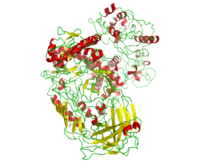Polymerase

Structure of Taq DNA polymerase
A polymerase is an enzyme (EC 2.7.7.6/7/19/48/49) that synthesizes long chains or polymers of nucleic acids. DNA polymerase and RNA polymerase are used to assemble DNA and RNA molecules, respectively, by copying a DNA or RNA template strand using base-pairing interactions.
A polymerase from the thermophilic bacterium, Thermus aquaticus (Taq) (PDB 1BGX, EC 2.7.7.7) is used in the polymerase chain reaction, an important technique of molecular biology.
Other well-known polymerases include:
- Terminal Deoxynucleotidyl Transferase (TDT), which lends diversity to antibody heavy chains
- Reverse Transcriptase, an enzyme used by RNA retroviruses like HIV, which is used to create a complementary strand to the preexisting strand of viral RNA before it can be integrated into the DNA of the host cell. It is also a major target for antiviral drugs.
See also
- DNA polymerase
- DNA polymerase I
- DNA polymerase II
- DNA polymerase III holoenzyme
- DNA polymerase IV (DinB) – SOS repair polymerase
- DNA polymerase V (UmuD'2C) - SOS repair polymerase
- RNA polymerase
This article is issued from Wikipedia - version of the 2/10/2016. The text is available under the Creative Commons Attribution/Share Alike but additional terms may apply for the media files.